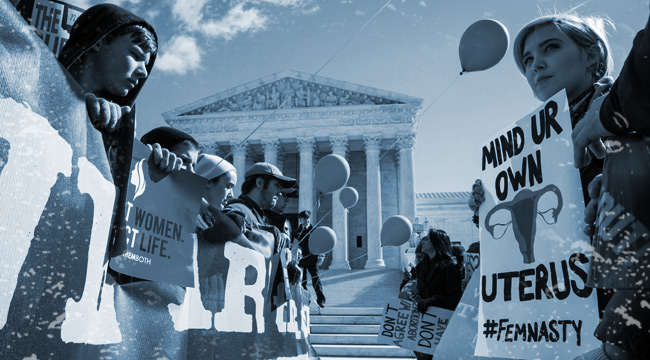
On Monday, the United States Supreme Court delivered rulings on three final cases before adjourning for summer recess. Voisine v. United States and McDonnell v. United States concerned domestic violence misdemeanors turned federal violations and Former Virginia governor Bob McDonnell’s past convictions respectively, but the third case posed the biggest challenge and the greatest potential for nationwide ramifications. That’s because Whole Woman’s Health v. Hellerstedt, a challenge to the 2013 Texas HB2 law, could shift the national conversation about abortion and women’s rights — that is, if Justice Scalia’s death and the court’s current even split of liberal and conservative justices doesn’t get in the way.
Yet the strong possibility of a tie was trumped when, by a 5-3 decision, the SCOTUS reversed the 5th Circuit Court’s decision and struck down the HB2 law. In other words, they invalidated the two specific restrictions Texas and subsequent lower court rulings had placed on, and enforced for women seeking abortions in the state.
SCOTUS invalidates Texas abortion restrictions.
— SCOTUSblog (@SCOTUSblog) June 27, 2016
The two provisions in question required (1) doctors who performed abortions to have hospital admissions privileges, and (2) clinics that provided abortions to provide surgical outpatient-like facilities. At first glance, these two restrictions might not seem like much — in fact, they may even sound medically sound. Yet specialized clinics were already routinely inspected and certified for state and federal health code restrictions, which required neither of these new limitations. As a result, Texas began closing clinics all over the state.
This placed an undue burden on doctors and clinics, and the SCOTUS’s majority opinion agreed:
Both the admitting-privileges and the surgical-center requirements place a substantial obstacle in the path of women seeking a previability abortion, constitute an undue burden on abortion access, and thus violate the Constitution.
The majority opinion was written by Justice Stephen Breyer, who was joined by none other than Justice Anthony Kennedy, a Republican whose vote on the matter was considered the swing that made the final 5-3 decision possible. “There was no significant health-related problem that the new law helped to cure,” Breyer wrote, adding that the provisions placed “an ‘undue burden’ on [women’s] constitutional right to do so.”
Meanwhile, Justice Ruth Bader Ginsburg provided the decision’s concurring opinion:
When a State severely limits access to safe and legal procedures, women in desperate circumstances may resort to unlicensed rogue practitioners, faute de mieux, at great risk to their health and safety.
Chief Justice John Roberts and justices Clarence Thomas and Samuel Alito dissented. Thomas in particular was unhappy with the majority’s ruling and wrote his own letter of dissent:
Today’s decision creates an abortion exception to ordinary rules of res judicata, ignores compelling evidence that Texas’ law imposes no unconstitutional burden, and disregards basic principles of the severability doctrine. I write separately to emphasize how today’s decision perpetuates the Court’s habit of applying different rules to different constitutional rights — especially the putative right to abortion.
Soon after the news broke, Whole Woman’s Health founder and CEO Amy Hagstrom Miller lauded the majority opinion:
Every day Whole Woman’s Health treats our patients with compassion, respect and dignity — and today the Supreme Court did the same. We’re thrilled that today justice was served and our clinics stay open.
(Via SCOTUSblog and United States Supreme Court)
